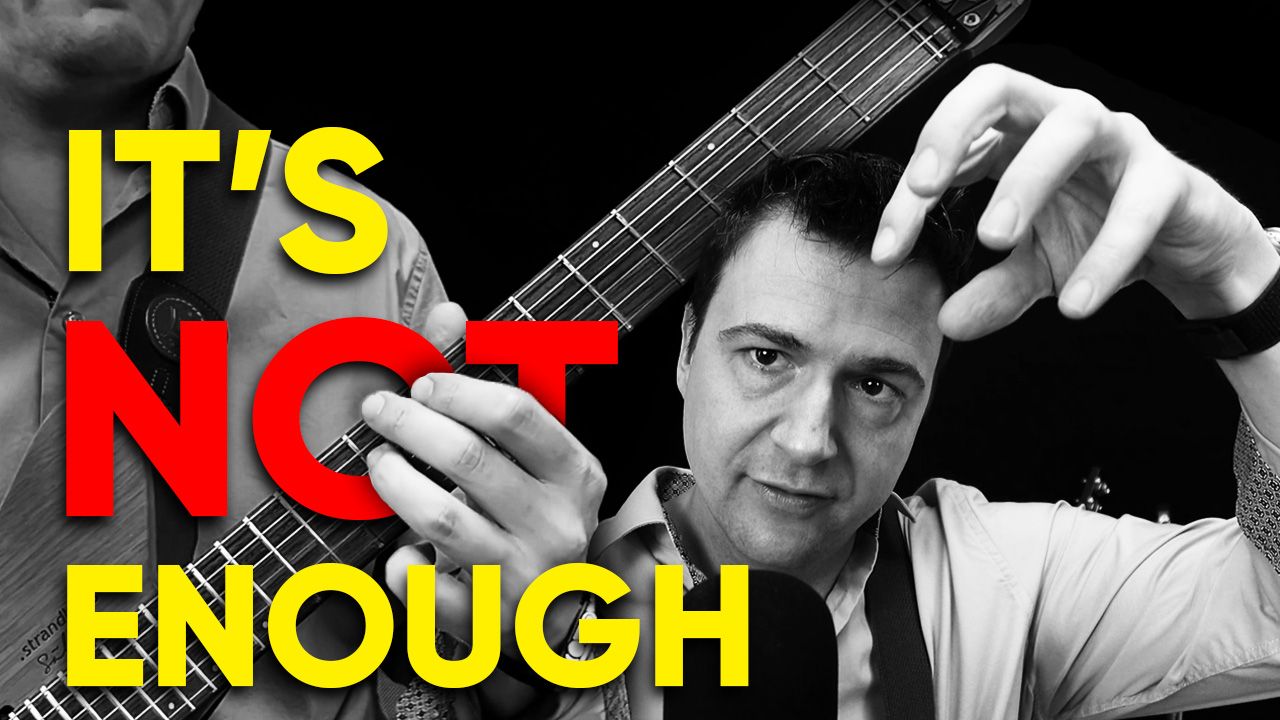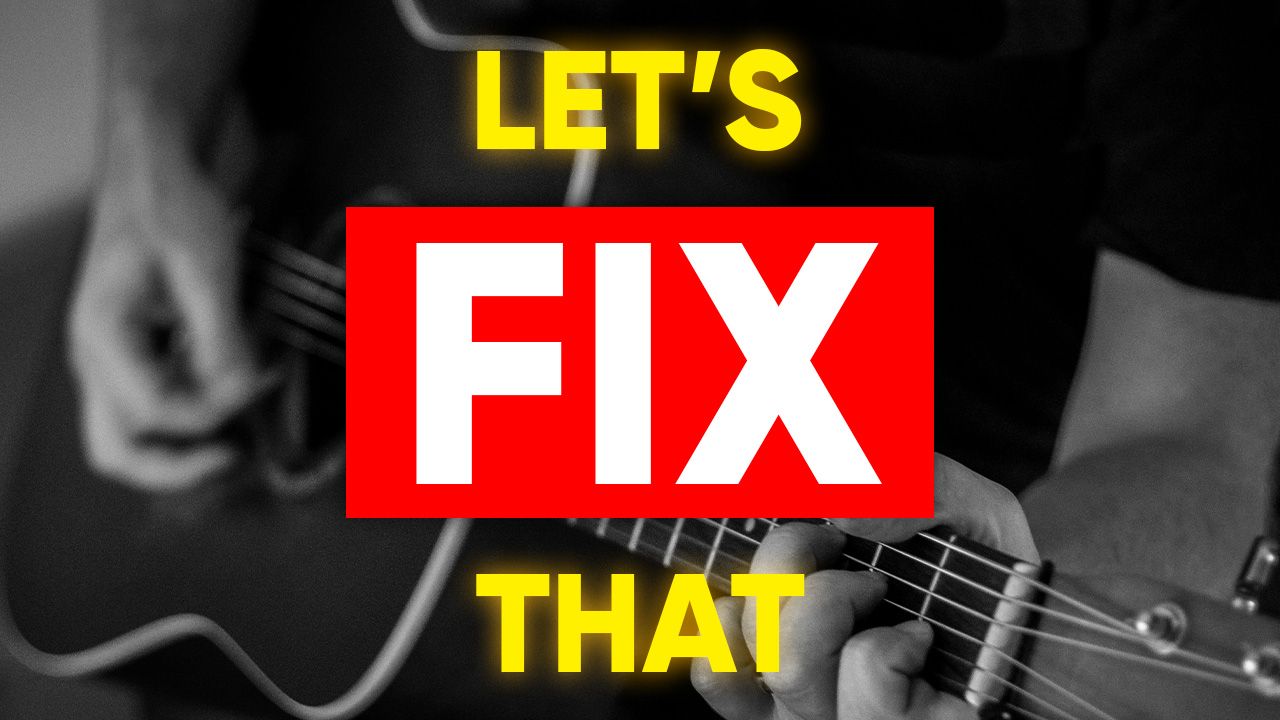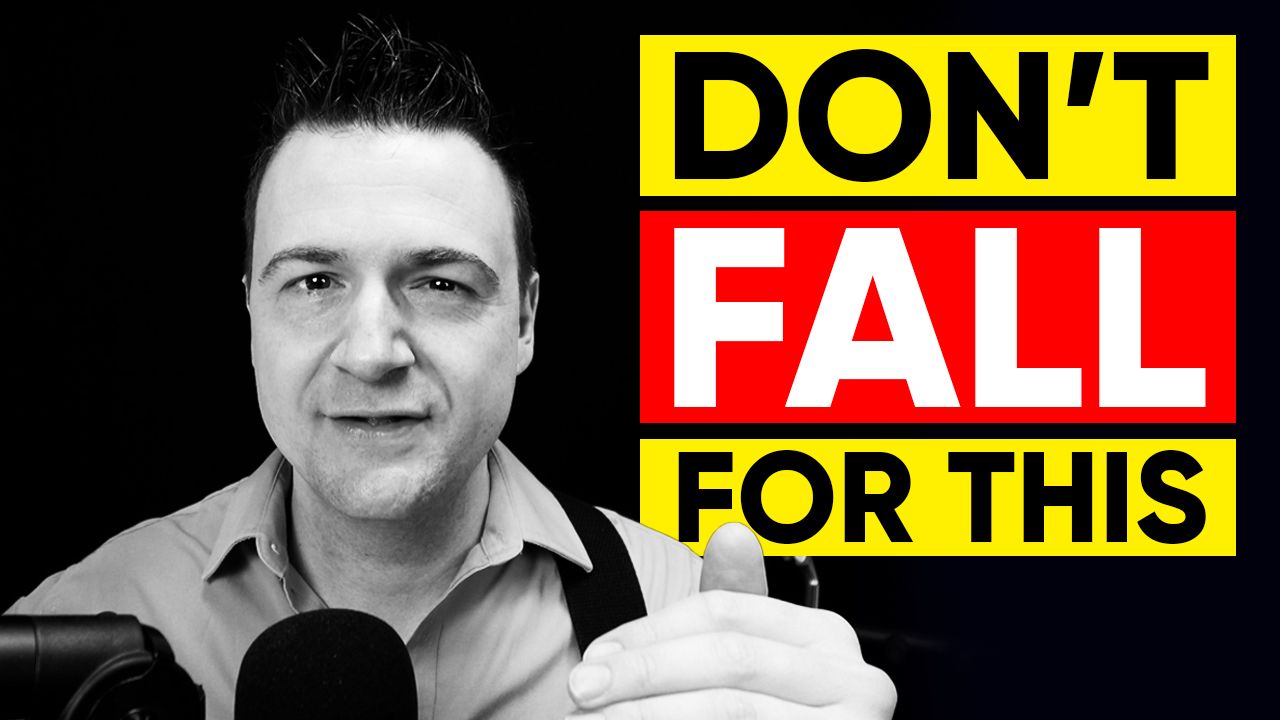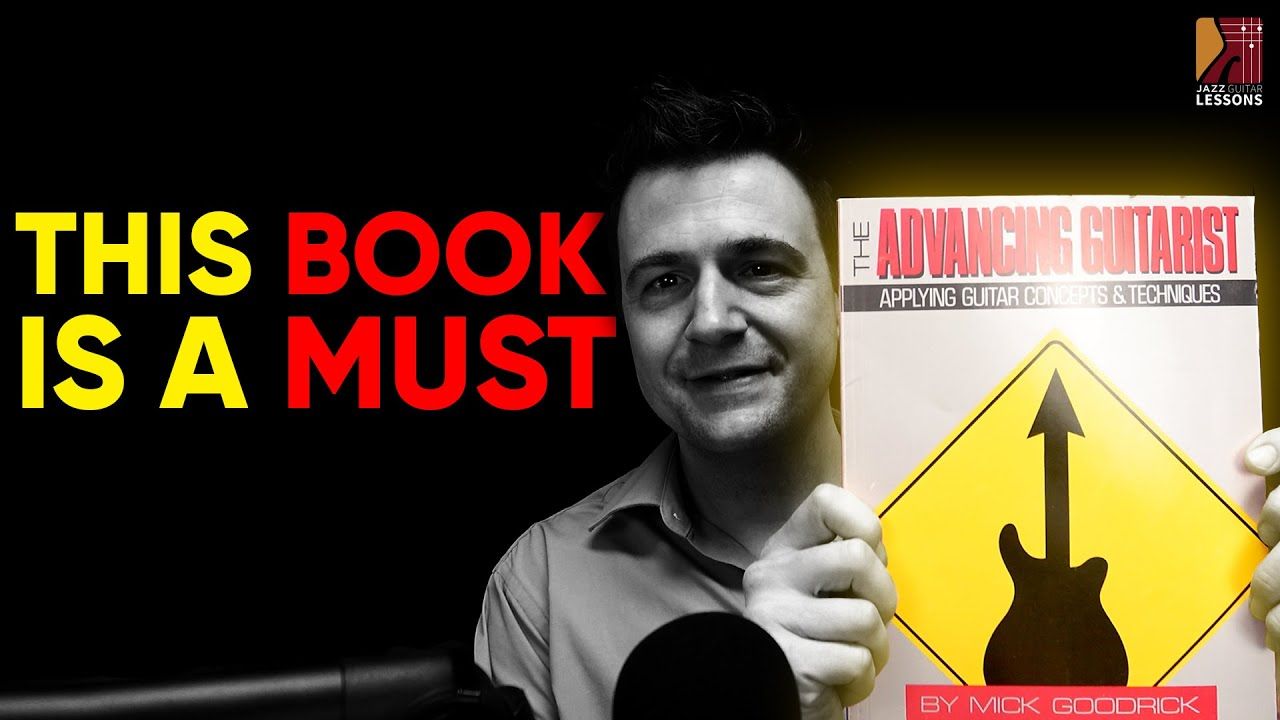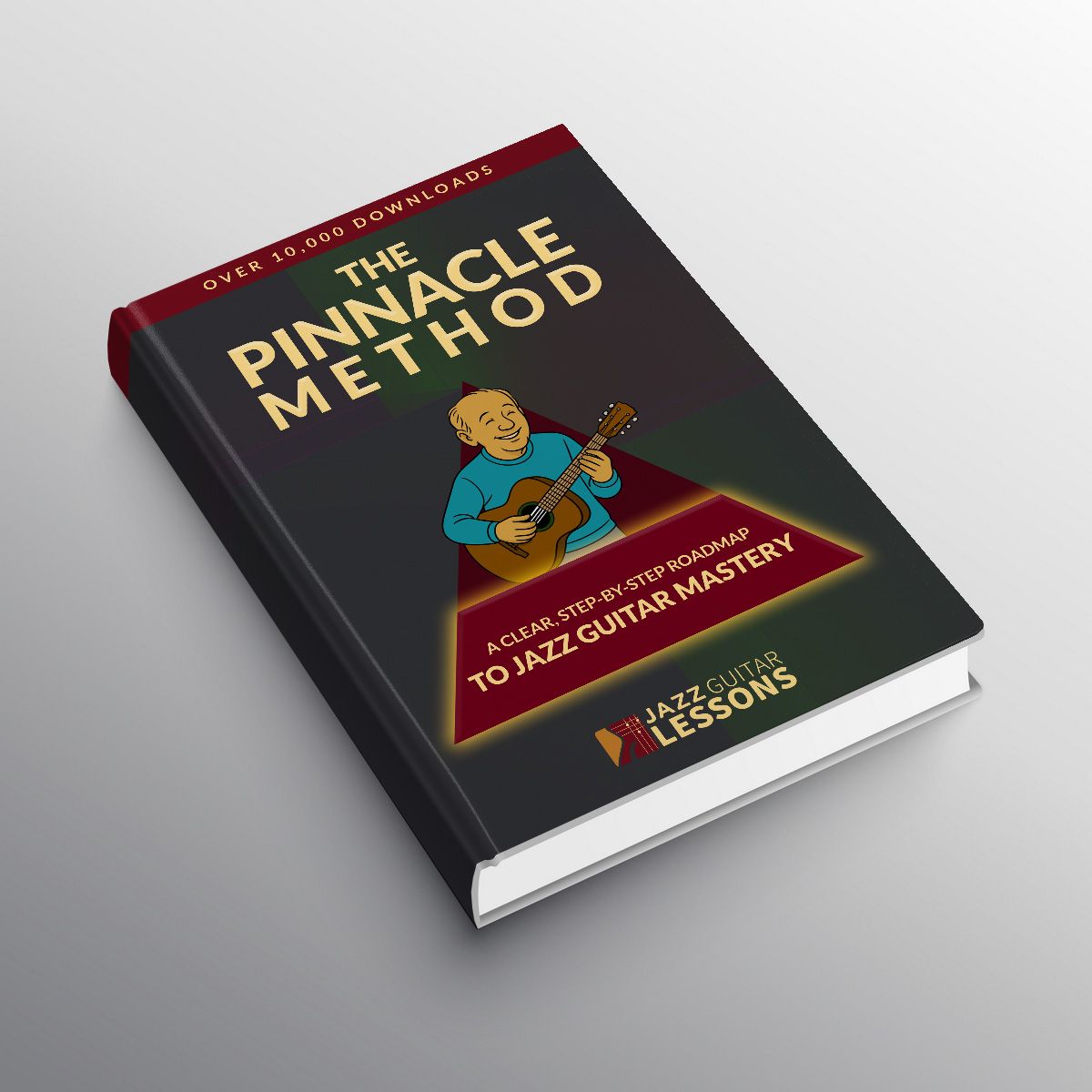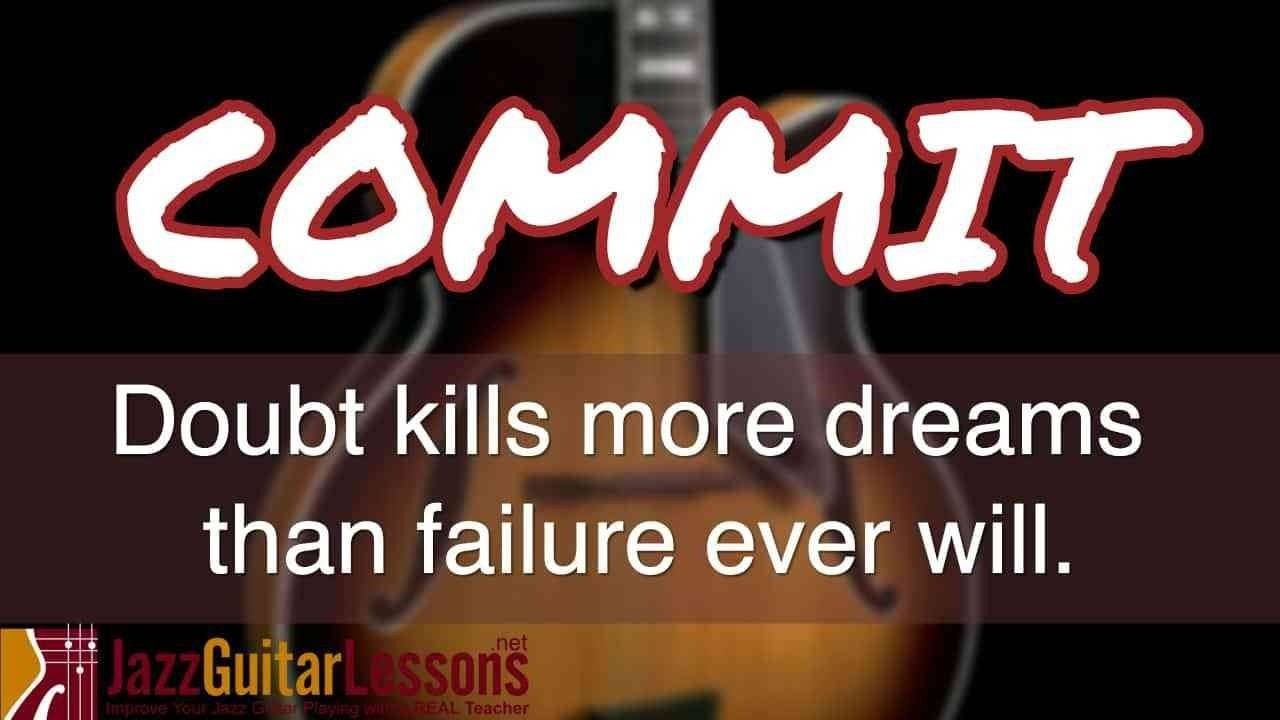
Commit: A Reason to Believe
May 03, 2017All too often, up-and-coming students of jazz guitar wind up feeling confused and overwhelmed. There's so much to learn online (and off!), and so little time! Websites such as this one are trying to help. But ... sometimes, the avalanche of information is hard to ignore. ;-)
As a jazz guitar instructor, it's my duty to provide clarity for everyone who's enthusiastic about learning and mastering the fine art jazz guitar. I've notably published Private Instructor in a Box, created to help students of all levels design their personal practice routine.
However, things can still get pretty blurry somewhere in the middle!
C'est la vie!

While learning, jazzers from all walks of life will have a moment when they doubt themselves. Worse, they'll chase after the "holy grail", DEMANDING that whatever they practice next be the absolutely perfect, #1, flawlessly mastered thing.
Let me reassure you right away -- whatever you choose to practice is fine. There's no holy grail, only experiences. It's the journey that matters. You can get organized and all, but shouldn't obsess too much over "Should I do Project A or should I do Project B?"
In this case, you should strive to do both, whenever possible.
Your Reason to Believe
The following is a question from Joel, a visitor and fan of this website. He was confused about practicing scales (chasing after this "holy grail" or ideal next step). I was able, I think, to help him out. This blog post is an adaption of the answer I provided to Joel in an email.
Hope some of this perspective can help you on your jazz guitar journey! :-)
The Question: Joel's Email
Email Subject: Reason to Believe...
You may be too young to remember this Tim Hardin song from 1965, later popularized by the Carpenters and Rod Stewart.
I love your lessons. I'd like to have access to all of them, as your great package offers.
So why haven't I bought it?
I am confused. (A confused prospect buys nothing.)
As I peek under the curtain of jazz music theory, I find there is a wealth of stuff --a universe of stuff-- that I don't know. There are all manner of things on the web. I've spent hours on Youtube, finding many good teachers with many different approaches. But many of them are mutually incompatible.
Should I focus on scales? Standards? Modes? I've been through your "design your practice" course [Private Instructor in a Box], and am stuck deciding what approach to take to scales.
I am willing to devote time to practice. But I want to have confidence that the path to which I commit will be reasonably efficient in getting me to be competent as a jazz guitar player.
Not for performing; just for playing, for myself and maybe friends, if I discover that I can achieve some modicum of confidence.
What can you tell me to help me decide to commit?
Warmly,
Joel
Looking for a reason to believe... :-)
How to Answer, and Why This Post?
Not so surprisingly, Joel is not the only one scratching his head and asking this question (and certainly not alone being confused by jazz guitar!). I personally receive emails like this on a weekly basis.
So here's the answer I provided Joel. I'm hoping the world will a little be better off if I share this. Don't be surprised if I direct you to this post in the future! ;)
TL;DR Version: The Key Points
- Commit: Fill your practice for scales with something (don't wait, just do);
- Learn about yourself: Learning about "how you learn" is part of the process too;
- Experiment: There's no one size fits all. You'll find your own optimal exercises by studying different options;
- Workout analogy: Are you a weightlifter? a runner? Or does yoga work for you?
The Actual Email Answer
Thanks for a very honest message and feedback, Joel. I'll do my best to give you a reason to believe (or better: get you believing, period!)
Long story short (and this is what I tell everybody): pick something you think makes sense, and commit to it. It can come from a book, an exercise video lesson, or plainly something you came up with. It doesn't matter as much as the concept of sticking to your guns.
Read between the lines: Simply fill the "scales" portion of your practice routine with something. Stick to it for 6 weeks. Then (only then) reassess and measure the impact.
Why? Because you literally cannot make a wrong decision.
Worst case scenario, you will just find a way that is not optimal for you. But rest assured there no universal and one-size fits all way to learn scales for everybody. You have to go through your experiments (I don't like the term, but say "mistakes") to grow as a player. You have to understand and try different approaches (see below for an analogy). This is implicitly part of your training program, even though I don't mention it in the In a Box course.
So, once again, what is important is that you:
- Decide
- Commit
- Put in the hours
- THEN reassess.

There's no holy grail. :-)
My Favorite Analogy
Now for an analogy with sports and exercise.
I'm a mesomorph. I'm past 5'11', but not quite 6 tall, and around 190-200 lbs on good days. I am relatively calm (you've seen my videos), I'm not jittery, and I'd rather watch Netflix than go for a run.
If I lift heavy things for a short while, I bulk. I have no interest in bodybuilding. But my dad is strong, my uncles are strong, my two brothers are strong. All farmers. And we typically bench press our own body weight and beyond ...
I spent too much time with a guitar in my hand in my 20's, so I have tiny wrists and forearm. But genetically, I have this farmer's thing going on "backstage", in my blood. In my bones. It's french Canadian muscle potential if you will!

See? Fits perfectly!
So, a friend of mine call and goes "Hey wanna go rock climbing?" Of course, I say "Yes." This little dude is 5'4'', 130 lbs. -- stringy, small hips and shoulders (total ectomorph).
This guy, my friend, races through climbing up a tree and he's 100% comfortable. I watch him in amazement. We attend a "climbing gym", and I can barely work through the beginner climbs. I try this for a month and I wind up with sore toenails, a whiplash, and bloody fingertips. I could've kept going, but this is not an activity my body adapts to very well. My skinny friend is perfectly at home with climbing, I'm not.
BUT -- It was okay to try for a while! Nothing lost, only experiences gained.
What Else?
I like a challenge and I'm ready to experiment (in my life, and in general). I've attempted, more or less seriously all of the following in the past few years: running, climbing, martial arts, gymnastics, suspension training, yoga classes, hiking, circuits in and out of the gym, sprints, calisthenics (i.e. movements using only your own bodyweight), etc.
I learned a lot from each activity!
But only when I really committed to moving heavy things around did I start to feel good. Real good. Things just went "click" and I committed.
I now consider myself a "powerlifter" (for lack of a better term -- I don't want to compete), and naturally gravitate towards activities that involve a barbell, sweat, and lots of weight on the bar!
Running? No thanks. I don't do that anymore! LOL
Since I committed to lifting "heavy" (well, heavy for me), my whiplashes went away, my sleep quality increased, I feel confident about the way I exercise and I can keep my nails to play guitar. :-)
Will I try running a marathon, or train for a triathlon? N E V E R
Will I try to get a black belt in Taekwondo? I'll break my back, and don't have the mobility for it.
Wish I had known from the beginning? Yes.
Was it fun to try the other things? You betcha!
Did I learn a lot and was this inevitable? Yes.
Last but not least: did I commit to each activity I tried before focusing on heavy weights?
Indeed. :-)
Back to Music
I know about 55 ways to practice scales and only teach and rely only a handful. I experimented a whole lot, though!
And so should you.
But you need to put the blinders on for a little while, and perceive whatever you chose to get better at scales -- your "new God" for a little while! :-)
P.S.
Enough with the B.S.: there are only three ways to practice scales. Vertical (positions), horizontal (up and down the fretboard - one string), and a blend of both vertical and horizontal (and I call this diagonal). The other concepts are just adding confusion.
Keep me posted Joel. :-)
Guess What? Joel Wrote Back!
His email:
This is a great and edifying answer, Marc!
You might consider turning it into a blog post; I suspect some others might feel as I do... :-)
Thank you again for really listening and really responding (and giving me a "reason to believe").
I will keep you posted.
Warmly,
Joel
You might be wondering where you'd like to start searching for for your "reason to believe". Suggestion: Spend some time with the Private Instructor In a Box. You won't regret it.


